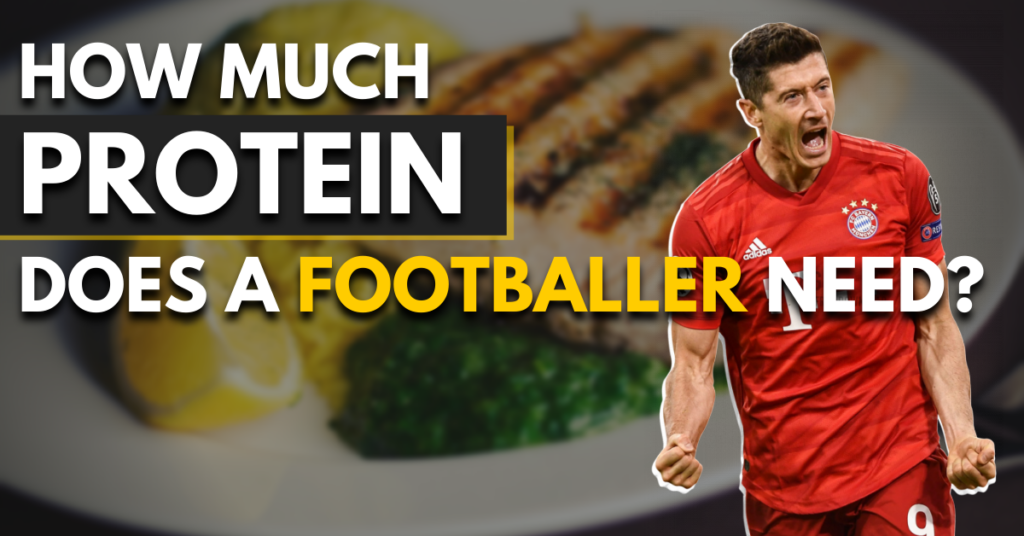
Protein is probably the “most popular” macronutrient in the football industry right now mainly due to the fact that it is directly linked to muscle – something pretty much every athlete and footballer is going after. However, the benefits go way beyond the muscle-building process.
WHAT IS PROTEIN & HOW MUCH DOES A FOOTBALLER NEED?
Proteins are macronutrients that play a major role in various functions of the body that are essential for life – including the muscle-building process. Proteins consist of amino acids. In that sense, amino acids are the building blocks of proteins and proteins are the building blocks of life (and muscle!). [1] A footballer can benefit from a nutrition high in protein in terms of recovery and performance (muscle-protein-synthesis).
Athletes in high-intensity and demanding sports, such as football, can benefit from a daily protein intake that is around 1.3 to 1.8 grams of protein per kilogram of bodyweight. This intake can be even higher during periods of higher volume/intensity training, injury rehabilitation, and/or during a fat-loss period, in an attempt to minimize lean mass loss (Stuart M Phillips, 2011). [2] Anything beyond that will not lead to further improvements in performance and recovery.
FUN FACT: the word protein comes from the Greek word “prōtos” and “ prōteios”, which mean “first” and “first quality”, indicating the primary role protein has in our lives.
PROTEIN IN FOOTBALL (EXAMPLE)
Above we mentioned how much protein a footballer typically needs to cover their needs and function properly. In this part of the article, we are going to give you some practical examples that you can apply directly to your nutrition.
At the end of the day, you’ll only need to calculate your protein intake by multiplying your weight in kilograms with your desired protein intake per Kg of body weight (1.3-2gr).
For example, a footballer that is in-season will typically need around 1.5-1.8gr of protein per kilogram of bodyweight. If that player weighs 70kg, he will need to consume somewhere between 105gr and 126gr of protein per day.
In higher volume and/or intensity periods, such as the pre-season, this same player might as well opt for 2gr of protein per kilogram of bodyweight, which would equal 140gr of protein per day.
The same could also apply to footballers that are rehabilitating from injuries or trying to shed some fat off their bodies, without having to worry much about losing muscle mass.
These numbers might seem a bit too big for many of you, however, by hitting these numbers/targets, you maximize your potential to recover and to get the adaptations/results you want from training.
To make your life a bit easier, here’s a list of foods that are rich in protein.
PROTEIN-RICH FOODS
- Chicken
- Turkey
- Beef
- Pork
- Eggs and Egg whites
- Fish (Salmon, Tuna, etc.)
- Lentils
- Beans
- Chickpeas
- Peas
- Tofu
- Quinoa
- Humus
- Cottage Cheese
- Milk
- Soy Milk
- Greek Yogurt
- Chia Seeds
- Flax Seeds
- Nut Butters
- Whey/Casein Protein Powder
Unfortunately, many protein-rich foods also have a high content of unhealthy fats e.g. pork fat. You can either remove these fats or choose fat-free options.
We shall also mention the fact that other foods are also high in protein, too. For example, wheat products, such as whole wheat bread, are a decent source of protein, although they’re primarily rich in carbohydrates. Therefore, when monitoring your protein intake (e.g. with the use of a calorie and macronutrient-counting app) you should also include all of the foods you consume.

*As an affiliate, I'm earning from qualifying purchases without any extra charges being placed on you.
HOW SHOULD I PLAN MY DAILY PROTEIN INTAKE FOR FOOTBALL?
There’s a lot of controversy around how much protein the body can really process and absorb at a time, with research being inconclusive and contradicting. There’s literature pointing out that anything above 25-30gr is oxidized for energy. [3] Is this the truth though? We do not know this yet. In fact, there’s also research that says that not all of that “excess” protein is used for oxidization. [4]
Having said that, most research suggests you split your protein intake into 4 meals/snacks that you’re basically going to consume throughout the whole day. As a result, you’d have 4 meals and/or snacks, with each of these containing somewhere between 25 to 35 grams of protein.
During of higher protein needs, feel free to add another meal or snack that is rich in proteins to hit your desired intake.
SHOULD I LOWER MY PROTEIN INTAKE ON RECOVERY DAYS?
Another question that might pop up in your mind is if you should lower your protein consumption on days of rest. Although your total caloric intake might decrease on recovery days, your protein intake shouldn’t.
In fact, you should aim for a high protein intake, just like you do on your training days. Since protein is a nutrient with a primary role in muscle (re)construction, it should be kept at high dosages to aid musculoskeletal recovery and growth.
FAT-LOSS & PROTEIN CONSUMPTION FOR FOOTBALL
Fat-loss is a really common process many players go through during their careers. Most of the time, it is advised to cut that excess fat during non-competitive periods (off-/pre-season) to minimize the effects of a reduced-calorie nutrition on performance.
Having said that, it is also suggested to sustain a high protein intake (1.5-2gr per Kg or bodyweight) throughout the whole fat-loss process for a number of reasons.
First of all, fat-loss is a process in which muscle mass is also lost because of the lower caloric intake. A high protein diet combined with an appropriate training regimen can outbalance that loss and minimize the muscle mass that is being cut off.
Furthermore, protein is also satiating, helping you regulate your hunger, which is something pretty common during extensive periods of fat-loss.
Click here to access the absolute guide for fat-loss in football.
PROTEIN SUPPLEMENTATION FOR FOOTBALL
Without a doubt, supplements are increasingly popular over the last decade, with protein topping the list of the most popular supplements. Should you supplement with protein as a footballer?

*As an affiliate, I'm earning from qualifying purchases without any extra charges being placed on you.
It depends. If you’re already following a healthy, nutritious diet as a footballer and want to add some extra protein to your nutrition, then protein powder can be a really convenient solution for you. However, in no way, shape, or form should protein be used as a meal replacement. Supplements should be strictly used to SUPPLEMENT an already existing and nutritious diet.
Whey and Casein protein are the most popular and complete options to choose from. Whey protein is easier to digest and absorb, making it a great post-training/match option, whereas Casein protein is a slower-digesting protein that is better-consumed pre-bed.
Click here to learn more about supplements and their effect on football performance and recovery.
CONCLUSION
Protein is and will always be a nutrient of high importance for human life – and especially footballers. Protein plays a major role in various functions of your body and moreover in muscle-protein-synthesis.
Following a nutrition that is high in protein is essential for athletes of any kind. If you want to maximize the results you’re getting from your daily training as well as to recover faster and better, you owe it to yourself to achieve a daily protein intake that covers your needs.




